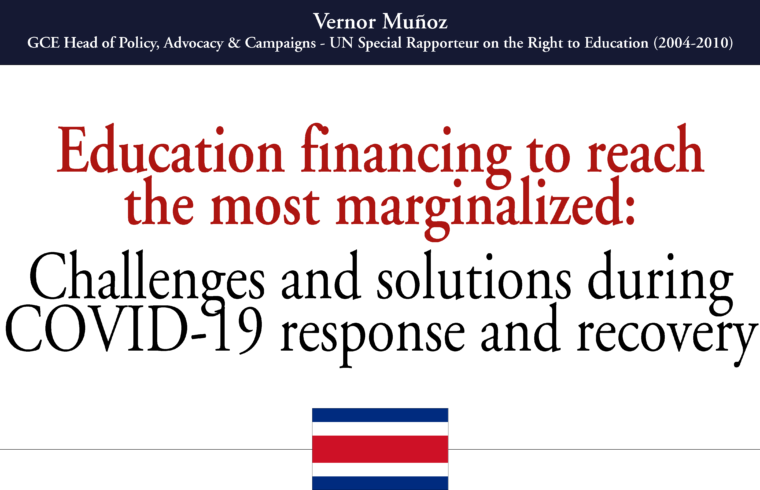Vernor Muñoz
GCE Head of Policy, Advocacy & Campaigns – UN Special Rapporteur on the Right to Education (2004-2010)
Education is first a universal human right: it should be guaranteed to all people in all cases, including sanitary emergencies. The COVID-19 outbreak is affecting girls and boys, women and men differently. And the pandemic impact on education was huge not only in terms of the number of schools closings but in terms of the terrible effect on those who live in rural areas, people with disabilities those who lack of electricity, electronic devices and internet access. The COVID-19 pandemic has put the entire Sustainable Development Agenda at risk in particular the right to education, affecting around One and a half billion learners in almost two hundred countries where schools have closed and learning disrupted.
However, the pandemic just reveled the exclusion and discrimination that was there before COVID-19. Most of current education problems come from outside the education systems and that is why the term “education crisis” is relative. Education financing and in general public financing is part of this concern.
While the international law states that governments should take steps to the maximum of their available resources to realize the right to education, the international political frameworks are more precise around their obligations on education financing. For instance, the Incheon Declaration aligned to the Sustainable Development Agenda states that all countries should allocate efficiently at least 4 – 6% of Gross Domestic Product and at least 15 – 20% of total public expenditure to education. These instruments also state that the Official Development Assistance by rich countries should achieve the target of 0.7% of gross national product for developing countries.
Despite these clear obligations, according to UNESCO, the total annual financing gap is around 39 billion dollars.
Now, it is well known that 97% of the new fi nancing needed to achieve the Sustainable Development Goal on education would need to come from domestic resources so the international cooperation should prioritize their aid to fragile and low-income countries. At the same time, international financing mechanisms should not lend to countries at moderate or high risk of debt distress, especially during the pandemic and obviously, banks should not be empowered to doing business at the cost of the sanitary emergency.
A few words on the private sector: I think private sector should contribute building an enabling environment, no doubt about it, but private sector should not lead the education governance, which is clearly a State central obligation. The participation of big corporates in national and international policy spaces on education should depend on companies having a reputation for solidarity, transparency and reciprocity – and paying fair taxes where they make profi ts is perhaps the most critical indicator of this. We should stress that the crisis in education financing arises in part from the aggressive tax avoidance by the richest companies that have left public budgets stripped of resources to fund quality public education.
Concerning the pathways to influence to mobilize action towards bold financing solutions for realizing the right to education, I would like to quickly suggest some urgent recommendations that the guests of this panel might wish to comment too:
In first place, states and international community must ensure the continuity of learning for all persons, including those who are most disadvantaged and likely to be excluded. Distance and virtual education is an option only if people has access to technology, so closing the digital and technological gap should be a priority.
Set progressive national budgeting, including the continued payment and incentives of teachers and school staff seems to be urgent as well. National budgeting for Education require four central obligations: Increasing the share of budgets for education, Increasing the size of budgets overall, Increasing the sensitivity of budgets in order to respond to the most marginalized and Increasing the scrutiny of budgets, so governments are accountable to people. Setting progressive budgeting obviously require tax justice schemes: this would be a fundamental shift in how the private sector engages with and supports the public sector in education.
The international architecture for cooperation to education should be strengthened, so the Global Partnership for Education and the Education Cannot Wait Fund can get the resources needed to support fragile and low-income countries.
International Community should consider debt cancellation and debt relief to unlock funds in developing countries’ budgets, and ensuring that the provision of additional finance does not put countries in higher risk of debt distress.
Finally, I think these difficult times offer a unique opportunity for all to review the current privatization and utilitarian trends of education and strengthen the public education systems so education remain as an enabling right, not only responding to the employers needs but to the development of respect for human dignity, as the Convention on the rights of the child states.











